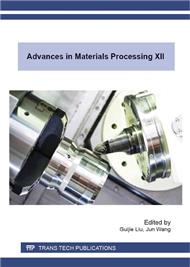[1]
S. Goel, X. Luo, R.L. Reuben, Molecular dynamics simulation model for the quantitative assessment of tool wear during single point diamond turning of cubic silicon carbide, Comput. Mater. Sci. 51 (2012) 402-408.
DOI: 10.1016/j.commatsci.2011.07.052
Google Scholar
[2]
N. Iwatani, H.D. Doan, K. Fushinobu, Optimization of near-infrared laser drilling of silicon carbide under water, Int. J. Heat Mass Transf. 71 (2014) 515-520.
DOI: 10.1016/j.ijheatmasstransfer.2013.12.046
Google Scholar
[3]
K. Katahira, H. Ohmori, S. Takesue, J. Komotori, K. Yamazaki, Effect of atmospheric-pressure plasma jet on polycrystalline diamond micro-milling of silicon carbide, CIRP Ann-Manuf. Technol. 64 (2015) 129-132.
DOI: 10.1016/j.cirp.2015.04.097
Google Scholar
[4]
S. Cvetkovic, C. Morsbach, L. Rissing, Ultra-precision dicing and wire sawing of silicon carbide (SiC), Microelectron. Eng. 88 (2011) 2500-2504.
DOI: 10.1016/j.mee.2011.02.026
Google Scholar
[5]
S. Goel, X. Luo, P. Comley, R.L. Reuben, A. Cox, Brittle–ductile transition during diamond turning of single crystal silicon carbide, Int. J. Mach. Tools Manuf. 65 (2013) 15-21.
DOI: 10.1016/j.ijmachtools.2012.09.001
Google Scholar
[6]
J. Yan, Z. Zhang, T. Kuriyagawa, Mechanism for material removal in diamond turning of reaction-bonded silicon carbide, Int. J. Mach. Tools Manuf. 49 (2009) 366-374.
DOI: 10.1016/j.ijmachtools.2008.12.007
Google Scholar
[7]
A. Beaucamp, Y. Namba, H. Combrinck, P. Charlton, R. Freeman, Shape adaptive grinding of CVD silicon carbide, CIRP Ann-Manuf. Technol. 63 (2014) 317-320.
DOI: 10.1016/j.cirp.2014.03.019
Google Scholar
[8]
X. Chen, X. Xu, X. Hu, J. Li, M.H. Jiang, S.Z. Jiang, Anisotropy of chemical mechanical polishing in silicon carbide substrates, Mater. Sci. Eng. B-Adv. Funct. Solid-State Mater. 142 (2007) 28-30.
DOI: 10.1016/j.mseb.2007.06.015
Google Scholar
[9]
R. Ji, Y. Liu, Y. Zhang, F. Wang, Machining performance of silicon carbide ceramic in end electric discharge milling, Int. J. Refract. Met. Hard Mat. 29 (2011) 117-122.
DOI: 10.1016/j.ijrmhm.2010.09.001
Google Scholar
[10]
Y. Liu, R. Ji, Q. Li, L. Yu, X. Li, Electric discharge milling of silicon carbide ceramic with high electrical resistivity, Int. J. Mach. Tools Manuf. 48 (2008) 1504-1508.
DOI: 10.1016/j.ijmachtools.2008.03.012
Google Scholar
[11]
P.J. Liew, J. Yan, T. Kuriyagawa, Experimental investigation on material migration phenomena in micro-EDM of reaction-bonded silicon carbide, Appl. Surf. Sci. 276 (2013) 731-743.
DOI: 10.1016/j.apsusc.2013.03.161
Google Scholar
[12]
I. Eichentopf, G. Boehm, T. Arnold, Etching mechanisms during plasma jet machining of silicon carbide, Surf. Coat. Technol. 2 (2011) S430-S434.
DOI: 10.1016/j.surfcoat.2011.03.003
Google Scholar
[13]
M. Herrmann, K. Sempf, H. Wendrock, M. Schneider, K. Kremmer, A. Michaelis, Electrochemical corrosion of silicon carbide ceramics in sodium hydroxide, J. Eur. Ceram. Soc. 34 (2014) 1687-1693.
DOI: 10.1016/j.jeurceramsoc.2013.12.043
Google Scholar
[14]
D.S. Srinivasu, D.A. Axinte, P.H. Shipway, J. Folkes, Influence of kinematic operating parameters on kerf geometry in abrasive waterjet machining of silicon carbide ceramics, Int. J. Mach. Tools Manuf. 49 (2009) 1077-1088.
DOI: 10.1016/j.ijmachtools.2009.07.007
Google Scholar
[15]
D.H. Duc, I. Naoki, F. Kazuyoshi, A study of near-infrared nanosecond laser ablation of silicon carbide, Int. J. Heat Mass Transf. 65 (2013) 713-718.
DOI: 10.1016/j.ijheatmasstransfer.2013.06.050
Google Scholar
[16]
B. Richerzhagen, M. Kutsuna, H. Okada, T. Ikeda, Waterjet-guided laser processing, Proc. SPIE. Int. Soc. Opt. Eng. 4830 (2003) 91-94.
DOI: 10.1117/12.486514
Google Scholar
[17]
R. Molian, C. Neumann, P. Shrotriya, P. Molian, Novel laser/water-jet hybrid manufacturing process for cutting ceramics, J. Manuf. Sci. Eng. Trans. ASME. 130 (2008) 361-374.
DOI: 10.1115/1.2844592
Google Scholar
[18]
D. Kalyanasundaram, P. Shrotriya, P. Molian, Obtaining a relationship between process parameters and fracture characteristics for hybrid CO2 laser/waterjet machining of ceramics, J. Eng. Mater. Technol. -Trans. ASME. 131 (2009) 110051-1100510.
DOI: 10.1115/1.3026547
Google Scholar
[19]
V. Tangwarodomnukun, J. Wang, C.Z. Huang, H.T. Zhu, An investigation of hybrid laser–waterjet ablation of silicon substrates, Int. J. Mach. Tools Manuf. 56 (2012) 39-49.
DOI: 10.1016/j.ijmachtools.2012.01.002
Google Scholar
[20]
H. Zhu, J. Wang, W.Y. Li, H.Z. Li, Microgrooving of germanium wafers using laser and hybrid laser-waterjet technologies, Adv. Mater. Res. 1017 (2014) 193-198.
DOI: 10.4028/www.scientific.net/amr.1017.193
Google Scholar


